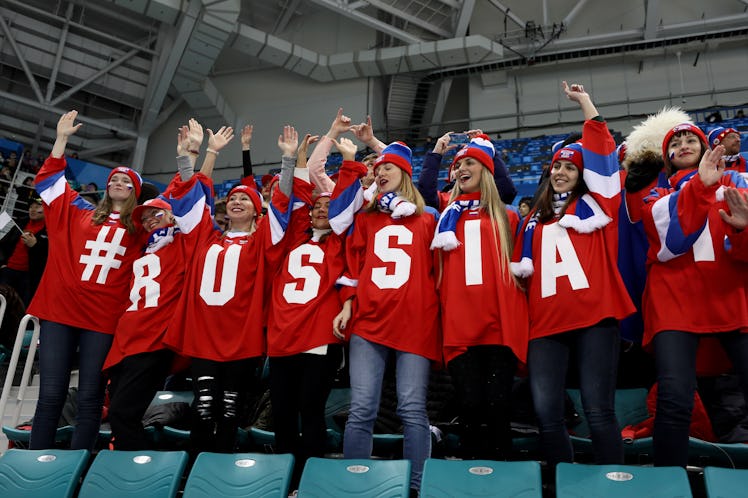
Team "OAR" At The 2018 Olympics Usually Goes By A Very Different Name
The Olympics are a chance for athletes to really step up to the plate and represent their respective nations on an international scale. But at this year's winter games there are a group of athletes that don't exactly get this privilege — and it's for a very serious reason. That group is known as "OAR" and these athletes were originally meant to represent Russia. So what does "OAR" actually stand for, and why can't the athletes compete under their own country's name and flag in PyeongChang?
The answer to this question is a little complicated. So if you're feeling a bit confused as to why this is all happening — don't worry, because you're definitely not alone here. The acronym "OAR" stands for Olympic Athletes from Russia. So yes, these athletes are in fact Russians. The only difference is that these athletes are not allowed to compete and directly represent their home country, hence the fact that their official Olympic team title only says that they're from Russia. There is no indication that they're actually representing Russia, as they're not allowed to compete wearing their country's colors and not allowed to raise the Russian flag if a medal is won. Instead, they compete under the Olympic flag and (if an athlete earns gold) play the Olympic theme instead of the Russian national anthem. Russia also is not allowed to add the medals that the OAR has earned into their official national medal count.
Why aren't these Russian athletes allowed to represent their own country in the 2018 Winter Olympics? Back on Dec. 5, 2017, the International Olympic Committee (IOC) made the decision to ban the nation from this year's games. The decision to ban that country came after a yearlong investigation into an extensive state sponsored doping program, meaning that the Russian government was supporting the supply of performance enhancing drugs to Russian athletes to give them a competitive edge in the competition.
Although Russia was banned from the 2018 Winter Olympics, the IOC ended up letting over 100 athletes from the country compete in the games. A specific panel was created by the IOC to review the athletes from Russia and determine which athletes were cleared as "clean" (or free from any performance enhancing drug use), and thus would be allowed to compete in South Korea. The OAR Invitation Review Panel met multiple times in order to decide which Russian athletes could be cleared after extensive review.
The only catch was that they would compete as the OAR, and Russia would not be credited with earning any medals.
The athletes that wound up attending the games were also given very specific and strict guidelines as to how they are allowed to dress for the Olympics as Team OAR. On Dec. 20, 2017, the IOC released their guidelines for the OAR team, which were determined by a special Olympic Athlete from Russia Implementation Group committee. Some of those guidelines are as follows,
1. Athletes’ uniforms (Ceremonies, competition, training and casual), accessories and equipment can only have two types of wordmarks: “OAR” and/or “Olympic Athlete from Russia”.
2. Officials’ uniforms (Ceremonies, competition, training and casual) and accessories can only have one type of wordmark: “OAR”.
3. “Olympic Athlete from Russia” - Print size for words "Olympic Athlete from" should be equivalent to the word "Russia" and above the word Russia. The size of these words should be proportional to the area in which they are placed and will require individual approvals from the IOC.
4. Wordmark fonts should be in English and as generic as possible.
But even if Russia is technically banned from the Olympics and the athletes are not allowed to display their nation's flag in any way, fans have still come out in full force and proudly wave red, blue, and white flags in the spectator stands. Russia's presence is still very clearly felt at the games despite the ban, so was this much of a punishment in the end? You be the judge.